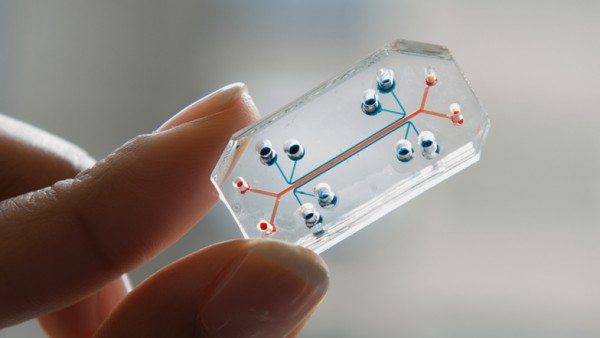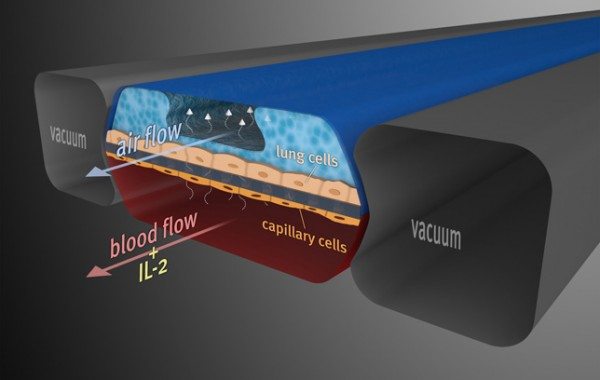Scientists Donald Ingber and Dan Dongeun Huh at Harvard University’s Wyss Institute for Biologically Inspired Engineering (Whew, that was a mouthful!) have developed microchip-like devices called Organs-on-Chips. These devices are transparent, flexible polymers (plastic) that contain microscopic channels. When living human cells from different organs like the lungs, gut, kidney, and liver are introduced through ports into the channels, the cells “will gather together into different tissue types” according to Tony Bahinski, a senior scientist at Wyss (as interviewed on Dezeen). The microscopic channels also carry fluids and gasses to the tissues to feed them. This imitates blood flow and air movement within the human body. Their first chip was a Lung-on-a-Chip (developed in 2010), that actually replicates the movement of human lungs while breathing. So far scientists have developed chips for the gut, liver, and kidneys and hope to continue developing more of these Organs-on-Chips and eventually put them together to emulate total human body functions. This will be especially useful to the pharmaceutical and cosmetics industries when testing the safety of new products. Scientists can introduce the test drug and observe and evaluate its effects as it travels through the “human body”. These can also be used to study treatments for infections and diseases.
The following images illustrate how the chips emulate body functions:
So, you’ve read this far without having your eyes glaze over due to the technical content of this news post. Now we can ask “What does this mean for us?” Well, this new technology is not only valuable because it effectively addresses the ethical concerns of testing on animals, but it will also be much more accurate in determining the true effects of new drugs on human beings. It may even substantially decrease the costs of new medications. Many of the drugs that successfully pass the animal testing stage are discovered to be ineffective in humans or have drastic, unacceptable side effects. The extreme expense of this drug testing process can potentially be avoided with the Organs-on-Chips technology. Woohoo! Thank you, Drs. Ingber and Huh!
The content for this post came from the following Dezeen articles: “Microdevices that mimic human organs could replace animal testing“, “Human Organs-on-Chips wins Design of the Year 2015“, and “Tiny devices replicate human organs to provide an alternative drug-testing method“.






Gadgeteer Comment Policy - Please read before commenting
We’re on the road to replacing ourselves with chips.
World population – 7 billion chips. 😀